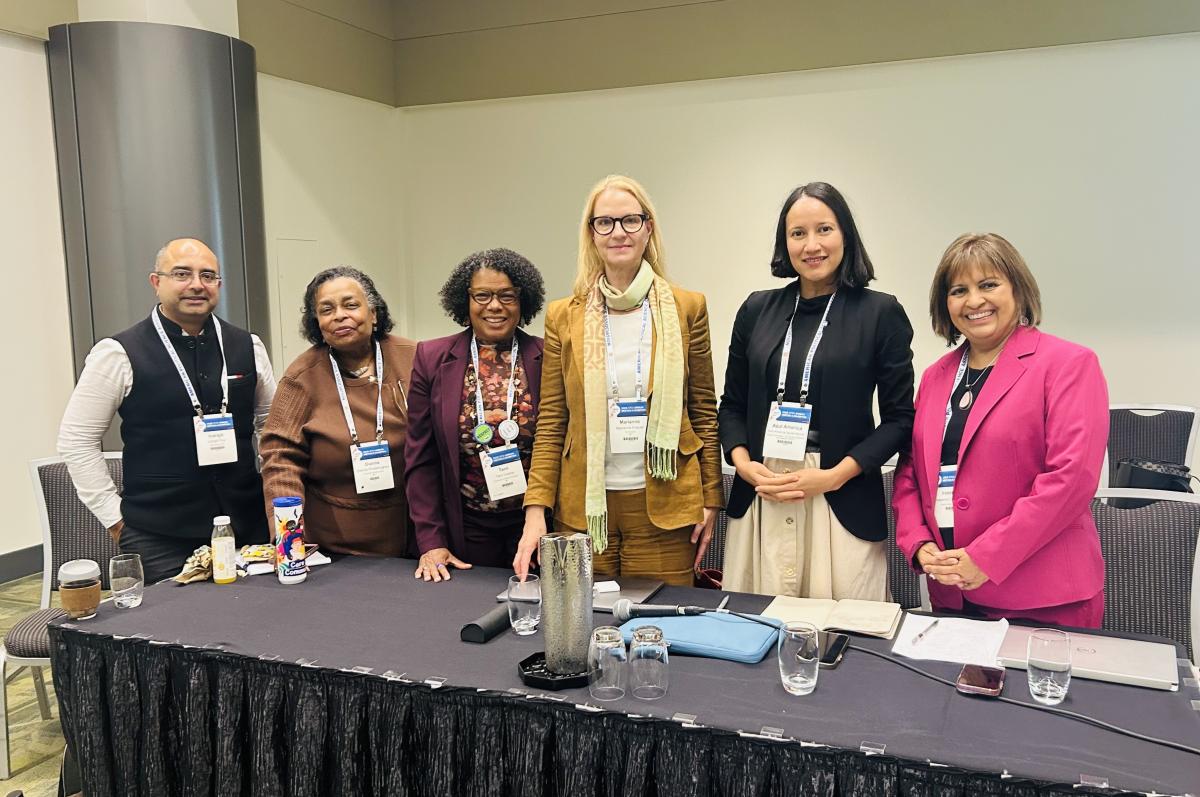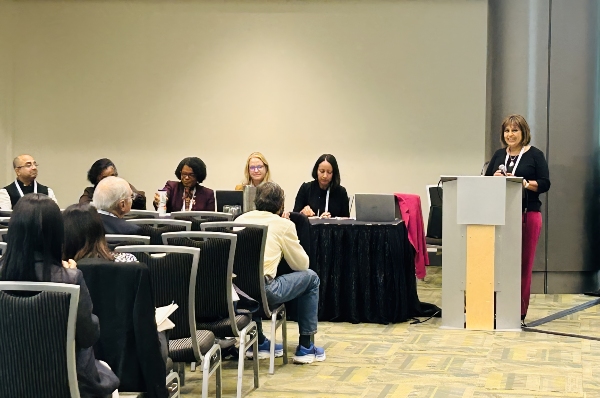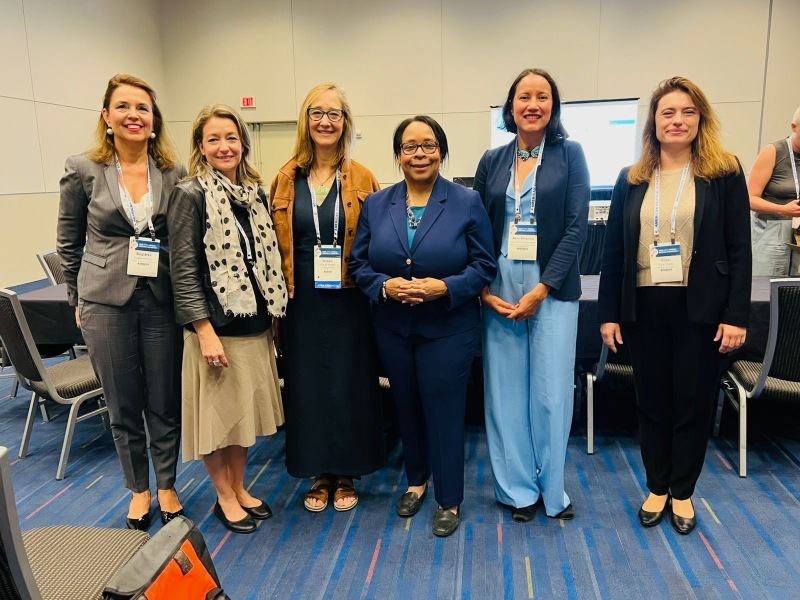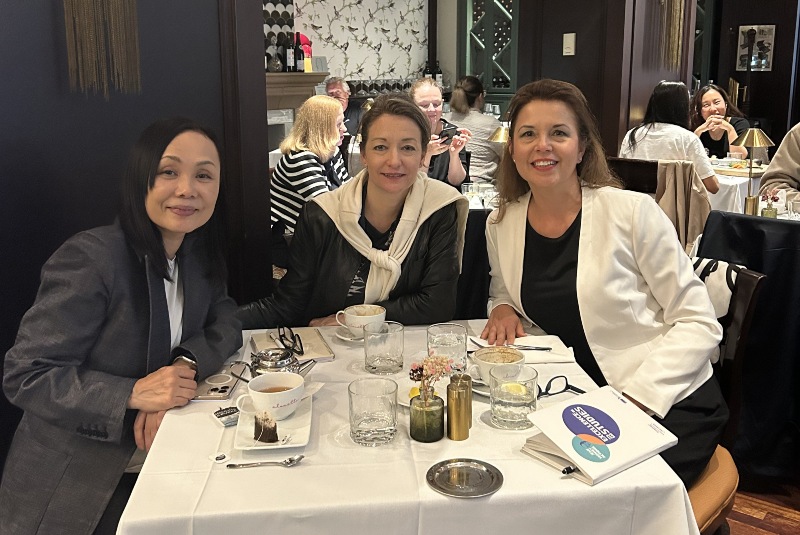

IPSA at the 2025 APSA Annual Meeting: Advancing Political Science Research and Global Collaboration
Publication date: Tue, 21 Oct 2025
Photo (left to right): Indrajit Roy (IPSA EC member, University of York); Dianne Pinderhughes (IPSA Past President, University of Notre Dame); Terri E. Givens (University of British Columbia); Marianne Kneuer (IPSA Past President, TU Dresden); Azul A. Aguiar Aguilar (IPSA Summer Schools Coordinator, ITESO, the Jesuit University of Guadalajara); and Irasema Coronado (Former EC member, Arizona State University).
IPSA was represented by a strong delegation at the 2025 APSA Annual Meeting, held under the theme Reimagining Politics, Power, and Peoplehood in Crisis Times in Vancouver, Canada, from 11 to 14 September 2025. The delegation included IPSA President Yuko Kasuya, Past Presidents Dianne Pinderhughes and Marianne Kneuer, several Executive Committee (EC) members, and Executive Director Kim Fontaine-Skronski. The IPSA delegation participated in academic sessions and held official meetings during the event.
I PSA Roundtable
PSA Roundtable
Transnational Political Reverberations: Analyzing the Global Impact of the Trump Administration on Canada, Germany, Mexico, the United States and India
Chaired by Irasema Coronado (former EC member), the IPSA roundtable on 12 September explored the Trump administration’s transnational political impact, with a focus on its reverberations across Canada, Germany, Mexico, India, and the United States itself. Drawing on case studies from each country, the roundtable examined how Trump-era policies and rhetoric influenced foreign relations, fueled domestic political shifts, challenged multilateralism, and reshaped national identities. Participants included Dianne Pinderhughes (IPSA Past President, University of Notre Dame); Marianne Kneuer (IPSA Past President, TU Dresden); Azul A. Aguiar Aguilar (IPSA Summer Schools Coordinator, ITESO, the Jesuit University of Guadalajara); Indrajit Roy (IPSA EC member, University of York); and Terri E. Givens (University of British Columbia).
Photo: Former IPSA Executive Committee member Irasema Coronado chairs the IPSA roundtable on Transnational Political Reverberations.
 APSA Association Leadership Meeting
APSA Association Leadership Meeting
The APSA Association Leadership Meeting brings together representatives from various international, regional, and national political science associations every year during the Annual Meeting to discuss common concerns and projects. This year, the meeting was attended by IPSA Executive Director Kim Fontaine-Skronski and several IPSA EC members representing their national association. Discussions focused on the increasing attacks on academic freedom (AF) around the world and, particularly, in the United States, and on measures that associations can take to help scholars facing censorship or even threats. Many representatives shared best practices on the matter. The incoming APSA President, Susan Stokes, informed the associations that she is leading a task force on AF and democratic backsliding, while the French Political Science Association representative, Elisa Chelle, talked about the association’s Observatory on Attacks to Academic Freedoms (Observatoire des atteintes à la liberté académique), created in 2023. IPSA Executive Director, Kim Fontaine-Skronski, mentioned the launch, in April 2025, of IPSA’s Guidelines on Academic Freedom Protection Procedures that aim at providing suggestions to national associations for the establishment of a nationally formalized procedure for monitoring eventual violations of the academic freedoms of political scientists. It was agreed to continue discussions in a virtual format in the Spring of 2026.
Photo (left to right): Boglárka Koller, President of the Central European Political Science Association (CPSA); Kim Fontaine-Skronski, Executive Director, IPSA; Susan Stokes, Incoming President of the American Political Science Association (APSA); Kimberly A. Mealy, Executive Director, APSA; Azul A. Aguiar Aguilar, President of the Mexican Political Science Association (AMECIP) and IPSA EC member; Elisa Chelle, Representative of the French Political Science Association (AFSP) and IPSA EC member.
IPSA Partner Associations Meeting
IPSA organized a high-level meeting with the representatives of three partner associations (APSA, ISA, ECPR) to discuss the use of AI in teaching, learning, and publishing. The meeting brought together IPSA President Yuko Kasuya, APSA Past President and IPSA Executive Committee member John Ishiyama, APSA Executive Director Kimberly A. Mealy, APSA Senior Director of Publications Jon Gurstelle, ECPR Executive Committee member Petra Guasti, ISA Director of Professional Development Sarah Dorr, and IPSA Executive Director Kim Fontaine-Skronski.
The discussion was built on earlier exchanges between APSA, ECPR, and IPSA leadership during the 2025 IPSA World Congress in July in Seoul. Discussion at the APSA meeting focused on the growing impact of artificial intelligence on political science research and publishing and explored opportunities for collaboration in developing shared AI guidelines across major political science associations.
 IPSA-CEPSA Leadership Meeting
IPSA-CEPSA Leadership Meeting
On 14 September, IPSA President Yuko Kasuya and Executive Director Kim Fontaine-Skronski met with Central European Political Science Association (CEPSA) President Boglárka Koller to discuss shared priorities and future collaborations. IPSA and CEPSA signed a Memorandum of Understanding (MoU) during the 2025 IPSA World Congress in Seoul to strengthen academic cooperation. The Vancouver meeting provided an opportunity to review progress since the MoU and to explore avenues for collaboration towards the 2027 IPSA World Congress in Rome.
Photo (left to right): IPSA President Yuko Kasuya, IPSA Executive Director Kim Fontaine-Skronski, and CEPSA President Boglárka Koller.
Other Panels
The IPSA delegation also participated in several panels. IPSA President Yuko Kasuya chaired the panel Polarization and Democratic Attitudes: Evidence from Asia and Beyond, and presented on two other panels: Generational Politics and Democratic Attitudes and New Methodological Frontiers in Democracy and Human Rights Research. IPSA EC member Min Hee Go presented her paper on the panel Politics and Gender in East Asia: Local, National, and Transnational Perspectives. EC member Indrajit Roy shared his research on the panel Political Economy, Development and Democracy in South Asia. IPSA Summer School Coordinator Azul A. Aguiar Aguilar also presented her paper on the panel Autocratization, Elections and Judicial Power in Latin America and Mexico.
Panels Organized by IPSA Research Committees
IPSA also presented three panels through its Research Committees:
- The Ab(uses) of State Power in a Changing World, organized by RC36 – Political Power;
- Political Parties and Democracy, organized by RC06 – Political Sociology;
- Automating Insights: Harnessing LLMs for Conflict and Human Rights Research, organized by RC01 – Concepts and Methods.
For further details, please visit the APSA Annual Meeting website.











